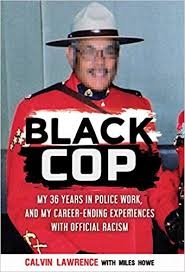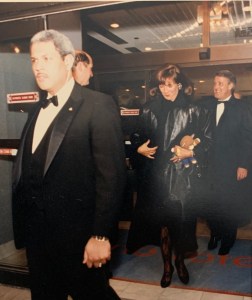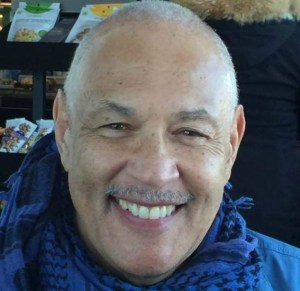His hiring as a Halifax police officer in 1969 happened only because the city feared what might happen if it didn’t at least pay lip service to inclusion. But over the course of his 36-year policing career, Calvin Lawrence proved a more than worthy fighter against racism.

Calvin Lawrence remembers the life-altering moment well. It was an early summer day in 1968 and Calvin, then 19 and still a student, was hanging out at Creighton and Gerrish Streets, “one of my favourite corners,” with his good friend Ricky Smith. A big Lincoln car filled with three senior members of the black community, including ex-boxer and community leader Buddy Daye, pulled up beside them.
“C’mon, get in boys,” one of the men said. “We’re going somewhere.”

Somewhere turned out to be the old Halifax police station on Brunswick Street. As Lawrence recounts the story in Black Cop (James Lorimer & Company Ltd.) — his excellent and well-worth-the-read account of his 36-year career as a police officer with both the Halifax force and the RCMP — “we were led down a squeaky clean hallway into what seemed like a prearranged meeting” with the city’s then-chief of police, Verdon Mitchell.
For a while, the two young men were just puzzled observers to a 90-minute conversation with the chief about policing in Halifax. “Finally,” Lawrence writes, “Buddy looked hard at Ricky and me. Without taking his eyes off of us, Buddy said to Chief Mitchell, ‘Perhaps you can give these two young men summer jobs.’”
For a young black man at the time, it was — or should have been — a golden opportunity.
But in 1968, Halifax had become a seething cauldron of racial tensions. The city’s destruction of Africville had been “disgusting,” Lawrence recalls. “It was shameful.”
The local black community, which had historically accepted racist behaviour as an “immovable object,” finally rebeled. “The anger of the community spilled out of the confines of the church and out of the established avenues of accepted activism.” There were riots — minor compared to what was happening in other cities in North America, but still cataclysmic for Halifax. The Black Panthers came to town, and brought with them the real possibility of organized, black-led violence. “Their tactics went beyond marching, singing, praying and demonstrating for change.”
All of that, of course, “scared the hell out of the city of Halifax and the Halifax police department.” And, in its way, it had led to that meeting in the chief’s office and to the offer of a summer job with the Halifax police department for Calvin Lawrence. “We were the unlikely cubs of the Black Panther Party’s time in Nova Scotia.”
“I was to be thrust into the eye of the storm that was pitting the city police against the black community,” he writes in the book. “What I didn’t know then — but what I do know now — was that I was a bargaining chip.” On the one hand, he and his friend were being offered up to the chief as potential young black police officers, a way out of the turmoil. “On the other side was the fear of the dark — the unknown of the Black Panther Party. We were just two little pieces of a puzzle, but the message to the white power structure was clear — put these boys in uniform, or the alternative might be more than you can handle.”

And that was the beginning of Calvin Lawrence’s career, first as a Halifax police officer (1969-1978) and, later, as a member of the RCMP.
Although he would remember moments of deep satisfaction — including a stint with the Prime Minister’s Protective Detail where his expertise in security made him the go-to consultant for police forces across the country, and beyond, who were looking for help with VIP security — racism was never far from his lived everyday experience.
There was that day inside the Halifax police station’s writing room where mug shots of those with outstanding warrants were posted when Lawrence found that someone had written on the black mugshots: “Nigger,” Coon” and “Calvin Lawrence.” He remembers white officers did nothing about it until he’d complained. Later, he would remember the RCMP’s Toronto drug section as “akin to working at a Ku Klux Klan affiliate. Some members in my section threw the word ‘nigger’ around like it was wedding confetti. A number of RCMP members in the section were either passively or actively racist; it seemed to be part of the culture. Not one person stood up against it, and I suffered because of it.”
Perhaps even worse were the seemingly reason-free-but-racist-upon-closer-examination denials of promotion, or permissions to take courses, refusals of requests for transfer and so on.
Like the very good young boxer he had once been, Calvin Lawrence confronted all of this directly — he filed freedom of information requests to document what had been done to him, complained to the human rights commission — until it all became overwhelming.
He was eventually diagnosed with PTSD. “My mental state,” he notes, “was not the result of my experiences as a police officer. It was due to an internal, co-ordinated attack on me by vindictive members, promoted and endorsed by the RCMP’s dysfunctional culture.”
In the end, beaten down but still proud, he accepted the inevitable and retired. “I retired with an immaculate record with two police agencies, and with a twenty-five-year and a twenty-year good conduct medal from the RCMP,” he writes proudly. “There are some who ask why I ever became a police officer,” he adds. “I answer, because I had a right to. I believed — and I still do — that my community was better served by me in a uniform than by a racist white cop. I had an opportunity thrown in my lap, and I ran with it and made the best of it that I could.”

I write all of this to make two points.
The first is that Black Cop (written with journalist and activist Miles Howe) is a book well worth the buying and the reading — not just for those interested in the big-picture issues of racism in policing in Canada but also for Nova Scotians who want to know how we got to where we are.
The second point is that — given Calvin Lawrence’s own inside-the-squad-room history and experiences — we need to listen when he cautions us about last month’s formal apology by new Halifax Police Chief Daniel Kinsella for the Halifax force’s racist practice of street-checking.
“On behalf of the Halifax Regional Police,” Kinsella told an audience of several hundred who’d gathered at the Halifax library, “I am sorry. I am sorry for our actions that caused you pain.” The chief promised the apology was only the first step in a process of healing wounds that date back to long before Calvin Lawrence joined the police force.
Lawrence calls the apology a “good start.”
“But an apology without change is just manipulation. He can apologize, but that does not transfer automatically to the rank and file police officer on the street. That’s where the proof of any change is going to come — that individual interaction by the police officer with somebody of the community, then you’re going to see if there’s going to be change.”
Members of the city’s black community will be watching. So should the rest of us.
This column first appeared in the Halifax Examiner December 9, 2019.




 STEPHEN KIMBER, a Professor of Journalism at the University of King's College in Halifax and co-founder of its MFA in Creative Nonfiction Program, is an award-winning writer, editor and broadcaster. He is the author of two novels and eight non-fiction books. Buy his books
STEPHEN KIMBER, a Professor of Journalism at the University of King's College in Halifax and co-founder of its MFA in Creative Nonfiction Program, is an award-winning writer, editor and broadcaster. He is the author of two novels and eight non-fiction books. Buy his books
To the people in power equality feels like oppression.
Thank you for your many years of service, I am sorry you had to endure the shameful treatment of racism by those in power and by your co-workers! I believe 100 % everything you reveal in your book, although I have not read your book….. I know that racism is alive and well here in Nova Scotia!